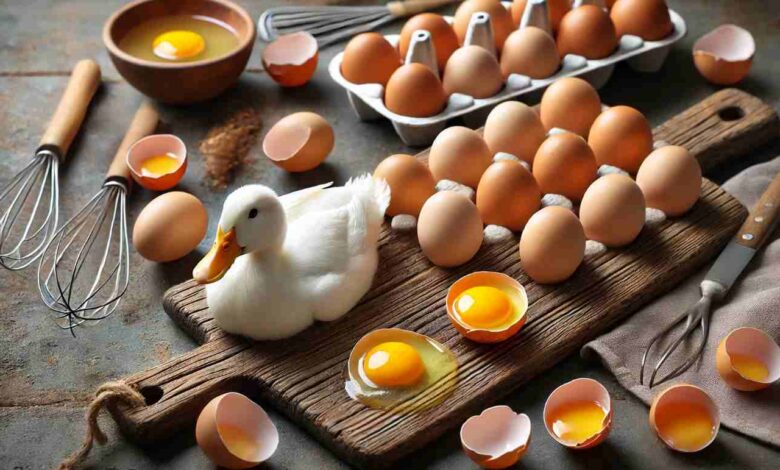Duck Eggs vs Chicken Eggs: Difference of Size, Nutrition, & More

If you’re curious about the differences between ‘duck eggs vs chicken eggs’ you’re in the right place. Both are common in kitchens, but they vary in size, nutrition, taste, and use. Let’s break down the key distinctions to help you decide which one suits your needs best.
Flavor and Cooking: Basic Differences
Duck eggs offer a distinct flavor profile: richer and creamier due to their larger yolks and higher fat content. While the taste of breeds like Pekin is milder, others, such as Muscovy, can yield stronger, gamey, or even “swampy” notes, especially when ducks have a wild diet. Chicken eggs, on the other hand, are more neutral and versatile, making them the default choice in many dishes.
In the kitchen, duck eggs perform similarly to chicken eggs, but their superior fat content makes them a baker’s treasure. They bring added fluffiness and richness to baked goods, resulting in cakes, breads, and pastries that rise higher and have enhanced texture. However, due to their lower water content, duck eggs can become rubbery if overcooked, so it’s essential to handle them gently when scrambling or frying.

Size and Shell Strength
A duck egg is significantly bigger than a chicken egg, weighing about 3.5 ounces compared to the 2.5 ounces of a large chicken egg. This size advantage extends to the yolk, which can be nearly twice as large as that of a chicken egg. Duck eggs are also tougher to crack due to their harder shells.
These eggs often feature pastel colors white, grey, and blue, with occasional speckles unlike the typical brown or white shells of chicken eggs. The thicker shell not only shields the embryo but also makes it harder for harmful bacteria to penetrate, allowing properly stored duck eggs to remain fresh for a longer period than chicken eggs.
Nutritional Value: Which is Healthier?
Nutritional profiles for 100 grams (3.5 ounces)
| Name | Duck Eggs | Chicken Eggs |
| Calories | 223 | 149 |
| Water | 70.8 g | 76.2 g |
| Protein | 12.8 g | 12.6 g |
| Fat | 18.5 g | 11 g |
| Cholesterol | 884 mg | 372 mg |
| Carbs | 1.4 g | 0.72 g |
| Minerals | ||
| Calcium | 64 mg | 56 mg |
| Magnesium | 17 mg | 12 mg |
| Potassium | 222 mg | 138 mg |
| Potassium | 36.4 micrograms (µg) | 0.7 µg |
| Sodium | 146 mg | 142 mg |
| Phosphorous | 220 mg | 198 mg |
| Iron | 3.8 mg | 1.7 mg |
| Zinc | 1.4 mg | 1.2 mg |
| Vitamins | ||
| Thiamin | 0.16 mg | 0.5 mg |
| Niacin | 0.2 mg | 0 mg |
| Riboflavin | 0.4 | 0.4 |
| Pantothenic Acid | 1.8 mg | 1.5 mg |
| Folate | 80 µg | 47 µg |
| Choline | 263 mg | 294 mg |
| Lutein + zeaxanthin | 460 µg | 500 µg |
| Vitamin A | 670 international unit (IU) | 540 IU |
| Vitamin E | 1.3 mg | 1 mg |
| Vitamin D | 70 IU | 80 IU |
| Vitamin K | 0.4 µg | 0.3 µg |
| Vitamin B6 | 0.2 mg | 0.1 mg |
| Vitamin B12 | 5.4 µg | 0.8 µg |
Availability and Cost
Duck eggs are not something you’ll likely find in most grocery stores, appearing mostly at specialty or Asian markets. Due to their rarity and excellent performance in baking, duck eggs typically cost between $6 and $12 per dozen. In contrast, chicken eggs are more affordable, generally priced between $2 and $5 per dozen, with higher prices for free range or organic varieties.
Egg Allergies and Dietary Considerations
The proteins in duck eggs differ from those in chicken eggs, making them tolerable for some people with chicken egg allergies. However, the reverse can also occur, so caution is advised if you have known allergies. Both types of eggs are linked to allergic reactions, ranging from mild indigestion to severe anaphylaxis.
Which Egg Should You Choose?
With that last, here you have duck vs. chicken eggs depending on what your needs are and whether you can work the extra considerations to get it right. Duck eggs are a good match for you if you like more flavor and creamier consistency, plus they work well in baking. Meanwhile, if value is your thing and you’re after less fat/cholesterol; chicken eggs it is. A bit of a matter of opinion question here even on their nutrient worth, but by and large, both eggs provide some fine nutrients, can be part of a healthy eating diet in due course!
Fans of cooking often like to use new ingredients, with duck eggs providing a unique flavor and texture experience most notably in baking. Though if convenience and cost are all you care about, chicken eggs will still do the job just fine.

How to Cook with Duck Eggs and Chicken Eggs
Duck eggs vs chicken eggs can be hard boiled, scrambled, or fried in similar ways. However, since duck eggs have thicker whites and larger yolks, they may require more time to cook thoroughly. When frying or poaching duck eggs, it’s wise to use lower heat to avoid browning the whites before the yolks are set.
In baking, duck eggs stand out due to their higher fat and protein content, which results in more tender cakes and flakier pastries. As a general rule, two duck eggs can substitute for three chicken eggs in most recipes, although you may need to adjust moisture levels since duck eggs contain less water. Their creamier yolks lend a luxurious texture to custards and sauces, but take care not to overcook them excess heat can cause proteins to coagulate, making the final product rubbery.
Environmental Impact and Farming
Ducks and chickens are raised in their own ways, this way affects the egg production and availability. Ducks tend to forage more and eat things like insects, which is good in terms of natural pest control. This results in a much richer, tastier egg when compared to caged chicken eggs. However, ducks take up more space and are impractical to manage on a large scale so duck eggs may not be as commercially available.
Chickens lay eggs, it is the only reason we farm them to such an unimaginable scale. Because they are more economical and have a better feed conversion rate owing to generations of optimized breeding, making chicken eggs fairly inexpensive with week after weeks worth available at most any supermarket. Chicken eggs are most commonly preferred by consumers because of their versatility and mild flavour.






